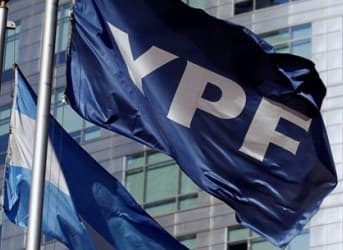One of the most feared words in every oilman’s lexicon is “nationalization.”
On 16 April Argentinean President Cristina Fernandez de Kirchner did exactly that with the energy firm Yacimientos Petroliferos Fiscales (YPF), introducing legislation for the partial renationalization of the firm, under which the state would purchase a 51 percent share, with the national government controlling 51 percent of this package and ten provincial governments receiving the remaining 49 percent. Ten days later the Argentinean Senate approved the takeover with 63 votes in favor of the measure, three opposing it and four abstentions. The action left Spanish firm Repsol with a 6.4 percent stake. Repsol called the action “unconstitutional, discriminatory and unlawful.”
YPF had been privatized in 1993 and was bought by Repsol six years later; the resulting merger produced Repsol YPF. For many Argentineans, whom polls show more than 62 percent supporting Kirchner’s policy, the government takeover of YPF reverses one of the more contentious privatizations urged on Argentina by international lending institutions like the IMF and World Bank during the previous two decades, unpopular policies that led to a sharp increase in unemployment and poverty for the Argentinean working class.
Needless to say, the action brought swift condemnation from not only Repsol but the European Union. Spain's Industry Minister Jose Manuel Soria pledged retaliation, saying, "The consequences will be in the areas of diplomacy, trade, industry and energy."
Not that Repsol didn’t see it coming, as Kirchner’s government for months had been complaining about Repsol YPF’s sluggish development of its Vaca Muerta shale gas concession. Adding to Buenos Aires’ anxieties, in 2011 Argentine international energy trade recorded an imbalance of $3 billion, the first negative figure since 1987, which is expected to surge to $14 billion this year.
The government estimates that $3 billion would be required over the next three years to get the Vaca Muerta shale gas extraction up and running, requiring roughly 3,000 shale oil and gas wells in an area where there are only 28 at the moment.
So, between surging energy import bills and Repsol YPF’s sluggish development, Kirchner’s government acted.
How much energy is at Vaca Muerta? Late last year YPF raised its estimates from around 900 million barrels of oil to nearly 22.5 billion after an auditing company accessed their Vaca Muerta Oil Shale field in Neuquen province. The Vaca Muerta formation is estimated to cover 7.4 million acres, of which Repsol YPF had a net 3 million acres.
But two major questions remain – for Repsol YPF, how much compensation can it wring out of the Argentinean government, and for Kirchner’s cabinet, where is the money to develop Vaca Muerta to come from?
Repsol YPF was not the only player in Vaca Muerta, just the largest. Other energy firms involved there include Americas Petrogas, Exxon Mobil, EOG Resources, Madalena Ventures and Apache Corp. Certainly Repsol is worried that Kirchner’s government might try to cut a deal with the competition, as on 6 May it wrote to oil majors including Exxon-Mobil, Chevron and Conoco-Phillips warning it would sue them if they tried to invest in YPF or its assets. The missive noted, “Repsol would take actions and/or legal proceedings necessary to protect our investment… to prevent any improper interference or unfair competition by third parties seeking to take advantage of the current circumstances to directly or indirectly acquire interests in YPF assets in which we have an interest.”
Repsol YPF estimated that $25 billion per year would be needed to exploit fully Vaca Muerta's shale oil and gas potential. Planning Minister Julio De Vido, and Economy Deputy Minister Axel Kicillof, who were put in charge of YPF, have already discreetly contacted Total of France, Petrobras of Brazil and U.S. companies Chevron, Conoco-Phillips, Exxon-Mobil and Apache Corp about possible partnering arrangements with YPF, but there have been no announcements. Needless to say, in light of what happened to Repsol YPF Buenos Aires would have to offer something significant before energy firms would pony up such vast sums. Accordingly, Argentina is most likely going to have to look for government-government relationships, particularly with China.
Repsol has demanded that Argentina pay it $10.5 billion in compensation for the expropriation, a valuation that reflects its highest share prices but Buenos Aires has said it will not accept Repsol’s terms.
Let the lawsuits begin.
By. John C.K. Daly of Oilprice.com


















